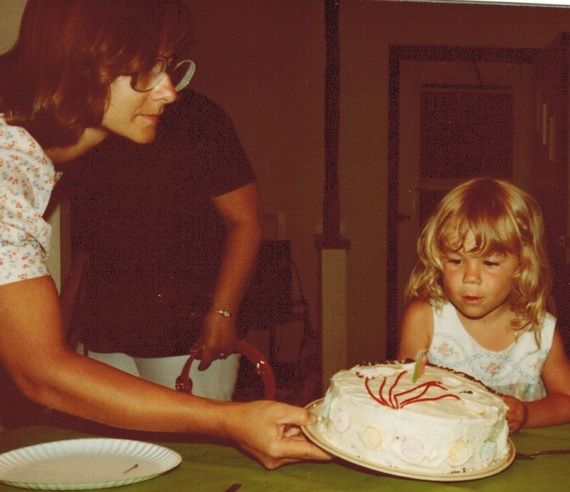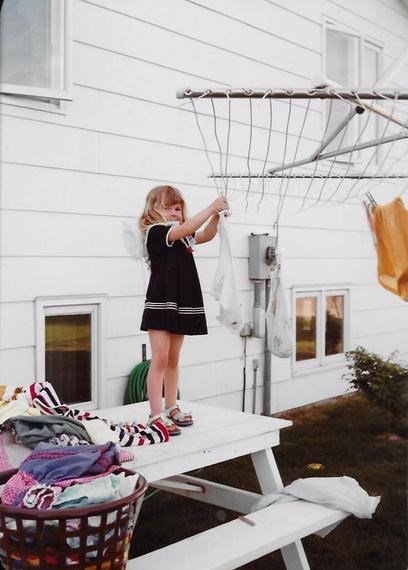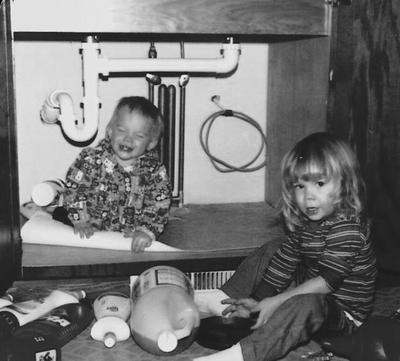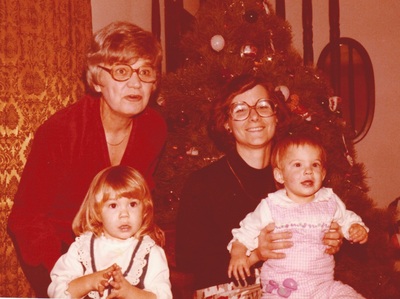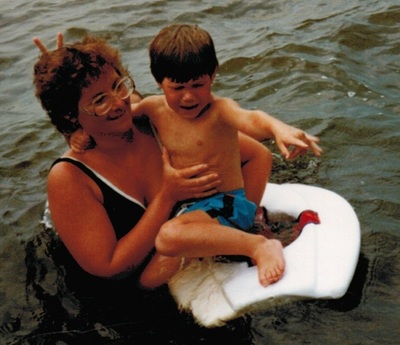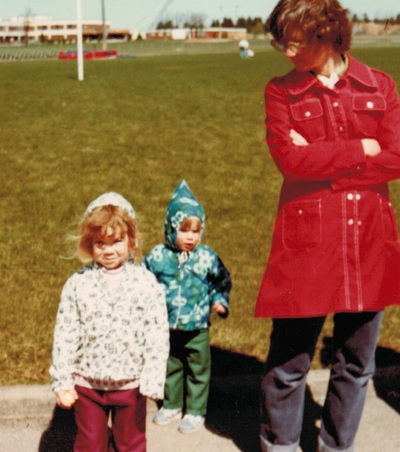As a teenager, people would often tell me, "You look just like your mother." I would smile and nod, but on the inside I was cringing. Like most headstrong teenage girls, I suppose, I wanted to be as different from my mom as possible. I wanted to look different and act different and be different from her. She was just mom. Plain and simple, ordinary.
I wanted extraordinary.
As children, we often strive for separation and differentiation from our parents, perhaps our mothers in particular. For many of us, our mothers were the mainstay in our childhood lives, the very epitome of regularity and the ordinary.
But we don't want ordinary; we want extraordinary.
But now that I am a mother myself, I find myself feeling this surprising desire to be more like my mom, to know more of her, to learn more from her because I realize that, through her, I learned the most important parenting lesson of all: how to make the ordinary extraordinary.
I recently discovered the following passage by William Martin:
"Do not ask your children
to strive for extraordinary lives.
Such striving may seem admirable,
but it is the way of foolishness.
Help them instead to find the wonder
and the marvel of an ordinary life.
Show them the joy of tasting
tomatoes, apples and pears.
Show them how to cry
when pets and people die.
Show them the infinite pleasure
in the touch of a hand.
And make the ordinary come alive for them.
The extraordinary will take care of itself."
And I realize that if I had to choose one thing for my own children, this would be it: make the ordinary extraordinary.
And I have my mother to thank for this. (Of course, if you asked my mom, she would probably mumble something about all of her shortcomings as a mom, all of the things that she should have done differently. I suppose that's just the way it is with mothers; we always feel like we are somehow failing despite all of the evidence to the contrary.)
My mom has taught me so much about what it means to be a woman and a mother, how to live authentically and honorably, and I am sure that she will continue to teach me more as time goes on. But everything that she has taught me -- and I suspect everything that she will continue to teach me -- stems from this one gift: Her ability to make the ordinary extraordinary.
And here are just a few of the ways that she did that:
1.Finding value in the seemingly insignificant, unproductive, and routine.
So often, as parents, we try to make these Big Memories and Once-In-A-Lifetime Moments with our children. We want the parent-child relationship to be an intoxicating mixture of magic and nostalgia. There is, I think, this natural tendency to wonder if we are doing enough, providing enough, and giving enough to our children. So we fantasize about sharing all of these big, once-in-a-lifetime experiences and opportunities, telling ourselves that these are the things that they will remember, that these are the ways we can show our love, that these are the ways to build a strong relationship.
But when I look back on my own childhood, it isn't the trips to Disney or the Kennedy Space Center or the Bahamas that I remember most (in fact, if it weren't for the pictures telling me that we did these things, I'm not sure I would remember them at all). Rather, it is all of the seemingly insignificant moments, the routine events, and the general sense of magic the permeated my entire childhood because of the profound value that my mom found in the task of child-rearing. Things like after school snacks and driving from one activity to the next, strawberry picking and swimming in a dirty lake, saying a prayer before dinner and extra-long tuck-in's at bedtime. These are the things that stand out, that I value the most, that I hold on to with tenderness and whimsy and awe. They were stitches in the patchwork quilt of childhood and, at the time, they faded into the background, relinquishing the spotlight to the Big Memories and Once-In-A-Lifetime Moments. But now, as a parent, I realize that these little things, these seemingly insignificant, routine, and unproductive things that we do with and for our children, are the things that hold it all together.
They are the things that holds us together.
2.Welcoming a few messes.
Whether it was because my mom saw the value in creating a few messes or because just didn't want to spend her time cleaning, my mom never seemed to mind a few messes. In fact, she might have even welcomed them.
Messy mean adventures and trying new things and experimenting. Messy means fingerpaints and crayon on the walls and spilled milk. Messy means sugar cookies baked with tiny hands and grass-stained knees and sand in the bottom of shoes. Messy means picnics and unmade beds and forts that take up the entire living room. Messy means learning and growing and living.
3.Showing that by opening your heart and home, you open the world.
"The more, the merrier" was (and is) a common theme for my mom. From afterschool gatherings and weeknight dinners to holiday parties and summer vacations, my mom embodied the very definition of inclusive. Everyone from old friends and new friends and friends-of-friends, from close family members to quirky (i.e., difficult) family members, from loved ones and sometimes even disliked ones were welcomed and included into her home and her heart. Through her words and actions, she taught me that, as a parent, we have both the opportunity and the responsibility to open up the world to our children -- and that that starts by opening our lives to welcome the friend, stranger, and sometimes even the enemy.
The world is a wild, beautiful, and sometimes uncomfortable place, and to open ourselves up to that wild world -- and to open up that wild world for our children -- we need to be open not just to the beautiful parts, but to the uncomfortable parts, as well.
4.Not sweating the small stuff.
My mom didn't spend a lot of time reading baby books telling about the latest developmental milestones or women's magazines advise her on the importance of this diet trend or that parenting technique. She followed her gut, used common sense, and trusted that things would work out. She knew that, despite our projections and fears, much of childhood is "just a phase." She rarely yelled and she didn't get in a frenzy about little things. She didn't spend a lot of time worrying about broken knickknacks, whether we should take soccer or gymnastics, or whether she had signed us up for the right "enrichment" classes. She simply dealt with the issue at hand as best she could, without extrapolation or conjecture, but with practicality and lots of love.
5.Encouraging Big and Bold Dreams, as well as soft and quiet dreams.
From the time our children are born, we start creating all of these Big and Bold Dreams for them. Report cards with straight A's, prom queen crowns, and Ivy League colleges. Athletic scholarships, prestigious degrees, fancy houses, and exciting careers. And maybe my mom was no different; maybe she had all of these Big and Bold Dreams for my siblings and me as well. But if she did, she didn't prioritize them over the soft and quiet dreams. Her dreams for herself and for her children seemed softer, less flashy, more simple: Give generously, love whole-heartedly, live joyfully.
As a parent, I find that it is all too easy to get caught up in things like grades and gifted programs, sports travel teams and varsity letters, prestigious colleges and fancy degrees. We want "the best" for our children, but sometimes what is really best for our children gets lost in the shuffle. Happiness loses out to prestige. Satisfaction loses out to financial security. Contentment loses out to comparison.
But even with an open-eyed awareness of how the world works and what it takes to "succeed," I find myself wanting the same hopes and dreams for my children that my mother had for us: Give generously, love whole-heartedly, live joyfully.
Go after your Big and Bold Dreams, I want to tell them. But don't sacrifice the soft and quiet ones either.
You can make the ordinary extraordinary.
Christine Organ writes regularly on her website. You can also follow her on Facebook and Twitter.
